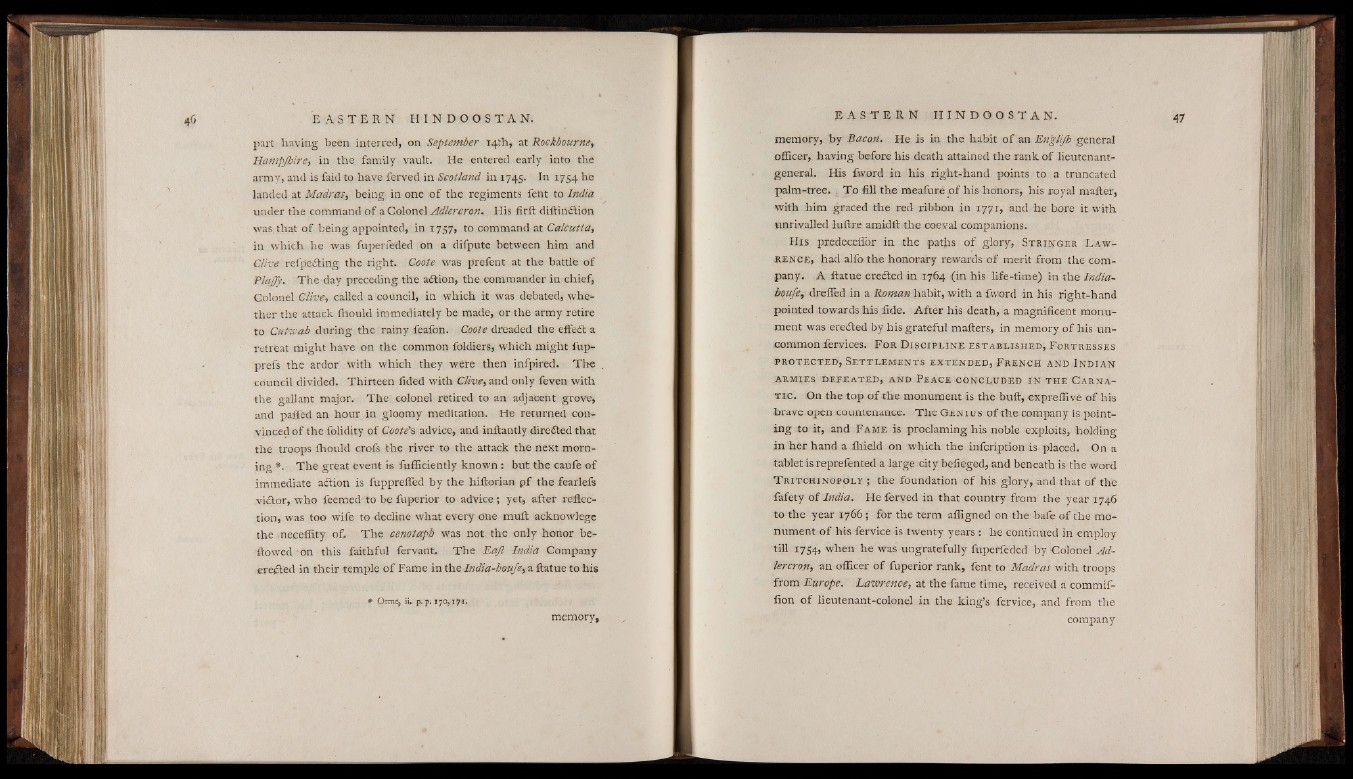
part having been interred, on September 14th, at Rockbourne,
Hampjbire, in the family vault. He entered early into the
army, and is faid to have ferved in Scotland in 1745. In 1754 he
landed at Madras, being in one o f the regiments fent to India
under the command of a Colonel Adlercron. His firft diftinCtion
was that of being appointed, in 1757, to command at Calcutta,
in which he was fuperfeded on a difpute between him and
Clive refpeCting the right. CoOte was prefent at the battle of
Plajffy. The day preceding the aCtion, the commander in chief,
Colonel Clive, called a council, in which it was debated, whether
the attack Ihould immediately be made, or the army retire
to Cutwab during the rainy feafon. Coote dreaded the effeCt a
retreat might have on the common foldiers, which might fup-
prefs the ardor with which they were then infpired. The
council divided. Thirteen fided with Clive, and only feven with
the gallant major. The colonel retired to an adjacent grove,
and paffed an hour in gloomy meditation. He returned convinced
of the folidity of Coote's advice, and inftantly directed that
the troops ihould crofs the river to the attack the next morning
*. The great event is fufficiently known : but the caufe of
immediate aCtion is fuppreffed by the hiftorian pf the fearleis
viCtor, who feemed to be fuperior to advice ; yet, after reflection,
was too wife to decline what every one muft acknowlege
the neceflity of. The cenotaph was not. the only honor bellowed
on this faithful fervant. The Eqfl India Company
ereCted in their temple o f Fame in the India-houje, a ftatue to his
# Qrme, ii, p. p. 170,151:1,
memory,
memory, by Bacon. He is in the habit o f an Englifli general
officer, having before his death attained the rank o f lieutenant-
general. His fword in his right-hand points to a truncated
palm-tree. , To fill the meafure o f his honors, his royal mailer,
with him graced the red ribbon in 177 r, and he bore it with
unrivalled luflre amidit the coeval companions.
His predecefibr in the paths o f glory, S t r i n g e r L a w r
e n c e , had alfo the honorary rewards of merit from the company.
A ftatue ereCted in 1764 (in his life-time) in the India-
boufe, drafted in a Roman habit, with a fword in his right-hand
pointed towards his fide. After his death, a magnificent monument
was ereCted by his grateful mailers, in memory o f his uncommon
fervioes. F o r D i s c i p l i n e e s t a b l i s h e d , F o r t r e s s e s
P R O T E C T E D , S E T T L E M E N T S E X T E N D E D , F R E N C H A N D I N D I A N
A RM IE S D E F E A T E D , A N D P E A C E C O N C L U D E D IN T H E C A R N A T
I C . On the top o f the monument is the buft, expr-effive o f his
brave open countenance. The G e n i u s of the company is pointing
to it, and F a m e is proclaming his noble exploits, holding
in her hand a iliield on which the infcription is placed. On a
tablet is reprefented a large city befieged, and beneath is the word
T r i t c h i n o p o l y ; the foundation o f his glory, and that of the
fafety of India. He ferved in that country from the year 1746
to the year 1766; for the term affigned on the bale o f the monument
o f his fervice is twenty years : he continued in employ
till 1754, when he was ungratefully fuperfeded by Colonel Adlercron,
an officer of fuperior rank, fent to Madras with troops
from Europe. Lawrence, at the fame time, received a commlf-
fion of lieutenant-eolonel in the king’s fervice, and from the
company